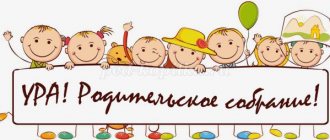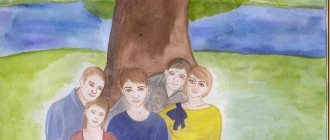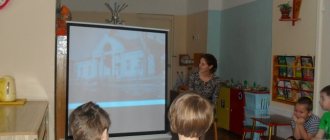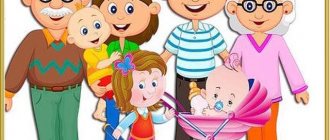Parent meeting in the preparatory group. Family and family traditions
Parent meeting in the preparatory group on the topic: “Family and family traditions”
Author: Knis Anna Nikolaevna, senior teacher. Place of work: MBDOU “Kindergarten No. 3 “Smile”, Kalach-on-Don. Description of work: Summary of the parent meeting on the topic: “Family and family traditions” in the preparatory group. This material can be useful for both teachers of early childhood development schools and preschool teachers. Goal : formation of family traditions. Objectives: to interest parents and children in studying the history of the origin of their family; instill respect for the cultural values of family and country; contribute to the formation of personality by studying the genealogy and life of their ancestors. Form of implementation: competitive program. Participants: parents, teachers, children. Plan of conduct 1 Introductory part. 2 Competition program. 3 Final part. Progress of the event I Preparatory stage. 1 Design of the photo album “Family Photos”, an exhibition of photographs of the group’s pupils in infancy and early childhood (photos are not signed). 2 Homework: create a pedigree of your family (family tree) and a family coat of arms. 3 Preparing a presentation of family photography. II Organizational stage. 1 Exhibition design: photographs of the group’s students, family trees, family coats of arms. 2 Wise thoughts about family are written on the easel. III Introductory part. Host: Good evening, dear parents, hello! Family means happiness, love and luck, Family means trips to the country in the summer. Family is a holiday, family dates, gifts, purchases, pleasant expenses. The birth of children, the first step, the first babble, dreams of good things, excitement and trepidation. Family is work, taking care of each other, Family is a lot of homework. Family is important! Family is difficult! But it is impossible to live happily alone! Always be together, take care of love, drive away insults and quarrels, I want your friends to say about you: What a good family this is! M. Langer Presenter: And now I invite you to take part in the “My Family” competition program. IV Competitions. 1. Family history. My pedigree (family tree). Presenter: Dear children and parents, I invite you to introduce us to the history of your family and present the family tree. 2. Family coat of arms. Host: And now the presentation of the family coat of arms.
3. Proverbs and sayings about family. Host: Proverbs and sayings about family have been collected for centuries. They contain the wisdom of the people. What proverbs and sayings about family have you prepared? 4. Warm-up with a ball (to the music, a ball or toy is passed from hand to hand, the music stops, and the family with the ball in their hands sings their favorite song or poem).
5. Funny family story. Host: Usually parents talk strictly and in a business-like manner with their children. I propose to introduce good humor and touching memories into our communication, and everyone will feel good and comfortable, and everyone will smile at each other. Remember funny stories about your family and tell us. 6. Family traditions. Host: Family tradition is what distinguishes one family from another and serves as an asset for descendants. Family traditions are norms, behavior patterns, customs and views accepted in the family that are passed on from generation to generation. What traditions have developed in your family? 7. Creative competition “Designing a family photo” (colored cardboard and paper, scissors, glue, pencils).
8. Warm up. Dance “Lavata” (teachers, parents, children). V Final part. Summarizing. Educator: Why does a modern person need to know the history of his family? Parents' answers... Conclusion: A person without this knowledge is like a leaf carried by the wind, it is easy to instill in him any truths, moral standards, it is very easy to control him. Educator: Dear parents! A tree with strong roots will not be knocked down by the wind. If we know the history of our country, kind of, we will not be afraid of any adversity. Decision of the parent meeting: 1. Maintain family traditions and create new ones. 2. Start creating a family album, family tree and family archive. Distribute instructions for parents on compiling the “Family Chronicle” album.
We recommend watching:
Parent meeting in the preparatory group. Notes Notes of the parent meeting in the preparatory group Parent meeting in the preparatory group. Psychological readiness for school Parent meeting - entertainment in a school preparatory group
Similar articles:
Parent meeting in the preparatory group “Soon to school.” Beginning of the year
Business game with parents at a parent meeting in kindergarten
Parent meeting in the preparatory group. Games with parents
Parent meeting in the preparatory group. Hyperactive child
Holiday "Family Traditions" in the senior group. Scenario
Parent meeting in kindergarten. Every family has its own traditions
GU Garden Secondary School
Parents' meeting
Every family has its own traditions.
Educator: Silyunina L.V.
Target:
promote the observance of existing family traditions and the emergence of new ones;
exchange of experience of family education and traditions; search for new forms of interaction between teachers and parents. Opening remarks
Dear parents!
Today we have gathered to talk about family, family traditions and their importance in the upbringing and development of a preschool child. Before starting our conversation, I suggest you warm up, relax a little and play. Warm up. Option 1. “The object of my childhood.”
Various items are laid out on the table.
This could be a ball, a doll, a soft toy, a note and other things. Everyone chooses for themselves an item that is connected with their childhood, and, if desired, tells the corresponding episode from their life. Option 2. Interesting question.
Invite parents to talk about what kind of family they like best.
Listen carefully, support the participants, repeat some of the mentioned qualities, ask again and clarify: what should this superfamily look like? How should the members of this family speak and what mood should they always be in? In conclusion, ask parents to share their impressions: was this exercise useful, what discoveries did they make for themselves while performing it. Conversation.
What do you think the word “family” means?
(Parents’ answers.)
According to V.I. Dahl’s definition, “a family is a collection of close relatives living together: parents with children.” Since ancient times, home and family have always been spoken of with love and respect. Legends, fairy tales, proverbs and sayings about family have come down to us from ancient times. Let's try to remember them. I start, and you finish.
- Being a guest is good, but being at home is better).
- The hut is not red in its corners, but... (red in its pies).
- As it is at home, so is it... (yourself).
- Children are not a burden, but... (a joy).
- When the family is together and... (heart in the right place).
- Every mother has her own... (the child is cute).
- You will find everything in the world except... (father and mother).
- The mother feeds the children like ... (the land of people).
- There is no kinder person... (father and mother).
- Family is... (seven I).
As the philosopher Ivan Aleksandrovich Ilyin said, “the family is the primary bosom of human culture. Here the dormant forces of the child’s soul begin to develop: here the child learns to love, believe and sacrifice, here the first foundations of his character are formed, here the main sources of his future happiness and bad weather are revealed in the child’s soul, here the child becomes a little person from whom a great personality or "maybe a low rogue." In the book “The Non-Standard Child,” psychologist Vladimir Levi reveals the “image of home” in all its diversity: “Home was hell for me. Scandals and accusations, prohibitions, mistrust, surveillance... The house broke me...” “The house was a paradise for me, and I paid for it. He turned out to be unadapted to real life - sheer disappointment. Longing for the unrealizable, the search for the impossible, in the end, atrophy of the will...” No! There should be neither hell nor heaven for a child - but a place where you can
live.
A place where you want
.
Of course, the psychological situation in the house is mainly determined by adults. The nature of the relationship with their son or daughter depends on their skill, tact, and patience. Who do you think plays the leading role in raising a child – the family or the kindergarten? (Answers from parents.)
The priority in raising a child undoubtedly belongs to the family.
“Kindergartens are family assistants in raising a child.” Dear fathers and mothers, grandfathers and grandmothers! You are your child's first and most important teachers. His first school - your home - will have a huge impact on what he considers important in life, on the formation of his value system. No matter how long we live, we still constantly turn to the experience of childhood, to life in the family: even a gray-haired veteran continues to refer to “what I was taught at home,” “what my mother taught me,” “what my father showed me.” . The family gives the child the most important thing - something that no other social institution can give: personal connection and unity with family. The social function of the family is psychological support, protection, shelter. The mother is the main teacher of the preschooler. The function of the mother and parents is to teach the child to live. But at the same time, the beloved mother should not duplicate the state institution and act as a teacher, thereby traumatizing the baby. The pinnacle of parenting is the well-being of children. And if the measure of things is a person, then the “measure” of parents is the child. The nature of a child’s emotional well-being or distress is determined by his emotional relationships with adults in the family. Communication with adults is one of the most important factors that influence the development of a child. The only real luxury is the luxury of human communication. — Do you think we know how to use this luxury in our families, do we teach this to our children? (Parents' answers.)
Let's talk about family traditions today:
Family.
I really love it when everyone gets together.
The table is covered with a white tablecloth. Grandma and Mom, Dad and I, We are called together - family. O. Vysotskaya. Family traditions
are, first of all, holidays that are celebrated by all family members and, of course, the child’s birthday;
gala dinners on weekends, when the whole family is gathered and a festive service. This could be a tradition of planting a tree or going out of town on New Year’s Eve to decorate a live Christmas tree. It is a tradition to visit exhibitions, theaters, and museums with your child. These are also cooperative games. Congratulations to relatives. Traditional hikes, walks and picnics in nature. Compiling your pedigree and family albums. Collecting and holding family concerts. Tradition 1. Family holidays.
— Do you think holidays are necessary for children in the family?
(Answers from parents.) Yes, for a child to fully develop, a holiday is necessary like air. A holiday for a child is not the same as for us adults. A holiday is an event in a child’s life, and a child counts his days from holiday to holiday, just like we do, his years from an important event to another. — How do you organize children's parties in your family? (Answers from parents.) Oddly enough, adults often organize children's parties for themselves. Adults have their own interests and conversations, but a child at such a holiday is bored and offended, everyone has forgotten about him. However, if a child is left at a common table, he becomes a witness and participant in adult conversations, then he gets used to being the center of attention, which develops immodesty and swagger in him. It should also be remembered that you should not try to force him to perform against the will of the child: to sing or recite poetry. The child himself will express a desire to sing or dance if it happens to him during the game or forfeit. — Do you think it is necessary to decorate an apartment or room for the holiday? What does this give to the child? (Parents' answers.) Yes, it is advisable to decorate. This creates a certain mood. And it is important for both adults and children to take part in this. On birthdays and holidays, it is customary to give gifts to children; they love and look forward to them. Gifts should be a little oversized, but in moderation. Each toy should develop the child’s thinking, attention, and memory. It is also good to give children sports toys: balls, jump ropes. For the development of fine motor skills - pencils, plasticine. By celebrating a holiday in the family, we show children an example of our holiday and leisure activities. Having matured, just like us, our children will also rest. Let no one in your home feel lonely and unwanted. Tradition 2. Family recreation in nature.
It's no secret that nature has a huge impact on the development of a child's personality, provides the opportunity for good communication with the child, and walks in nature have a beneficial effect on human health.
How nice it is to get together and go with the whole family out of town, where you can wander along forest paths with your child, admire the beauty of the surrounding nature, and play natural games with your child (“Who lives where”, “Guess by the description”, “Which tree is the leaf from” ). You can invite your child to draw interesting things in nature from life, collect natural materials with the children: pine cones, acorns, twigs, and make fun crafts at home. And it’s just great to have a snack in a forest clearing (while leaving to pick up your trash, teaching your child to behave correctly in nature, to take care of and protect our common home - the forest). Tradition 3. Family visits to theaters, museums, exhibitions.
— How many of you constantly go to museums and theaters with your children?
(Answers from parents.) Man has always had a desire for beauty. Each nation has its own culture, its own customs, its own traditions. We, adults, must help introduce children to the large and complex world of beauty, nature, and art. Visiting museums should be a holiday for the whole family. It is in our hands to raise children literate and educated, well-mannered, loving and respectful of their parents, who know their ancestry. Take care of each other.
Take care of each other, warm each other with kindness. Take care of each other, don't let us offend you. Take care of each other, forget all quarrels, and in your free moment, stay close to each other. O. Vysotskaya.





